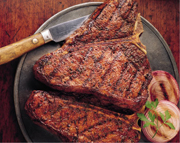Arizona Agriculture to Utilize another Educational Video
Published
2/12/2014
By Julie Murphree, Arizona Farm Bureau: You’ve heard it haven’t you? From you vegetarian friends. “If we’d just quit feeding livestock and convert everything to plant food, we’d feed everyone; feeding your cows our corn, soybean and other things

You scratch your head and try to explain and nothing really resonates with your friend. But maybe The Institute for Feed Education & Research can help through a recent video they produced.
The Institute for Feed Education & Research recently funded an issue paper by the Council for Agricultural Science and Technology, or CAST, entitled, “Animal Feed vs. Human Food: Challenges and Opportunities in Sustaining Animal Agriculture Toward 2050,” which CAST developed into a 12-minute video, “Is a Cow Eating My Lunch?” AFBF was a sponsor of the video.
While the video is a bit long, it’s worth the watch since it thoroughly explains why animal agriculture is needed in the mix of agriculture’s diverse mix of products.
Here's the beef on the beef and why it's needed in the food chain mix.
Aside from the well-known fact that as developing nations rise out of poverty more people are then financially equipped to purchase meat protein, “Is the Cow Eating My Lunch” video goes into great
One segment of the video I appreciated by Jude Capper from the University of Montana was how cattle eat things we can’t. Dr. Capper said, “Cattle eat many types of feed – substances that are not edible by humans. This means a more sustainable system.” She goes on to show that land incapable of supporting the production of human food crops can be used efficiently by ruminant animals to produce meat and milk products.
The reality is … you and I don’t eat grass. And, if we did our digestive systems can utilize the nutrients as well even if we tried.
The video provides science-based information about the "feed versus food" issue, including the following:
• Global animal agriculture provides safe, affordable, nutrient-dense foodstuffs that support human health and well-being as part of a balanced diet as well as many by-products that benefit humans.
• The global livestock industry faces considerable challenges as the population grows, and demands for more food must be aligned with concerns about the environment, economy, and sustainability. Many do not realize the productivity gains made by modern practices, by-product feeds, and technology.
• Livestock production is important in the economic and social sustainability of developed and developing countries alike.
It’s time to have this conversation over a juicy steak; tofu for your vegan friend.